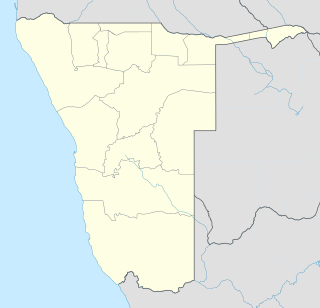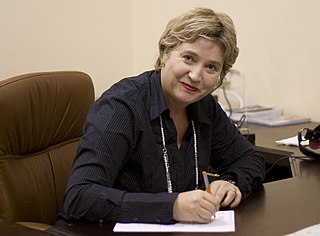Related Research Articles

Namibia, officially the Republic of Namibia, is a country in Southern Africa. Its western border is the Atlantic Ocean; it shares land borders with Zambia and Angola to the north, Botswana to the east and South Africa to the south and east. Although it does not border Zimbabwe, less than 200 metres of the Zambezi River separates the two countries. Namibia gained independence from South Africa on 21 March 1990, following the Namibian War of Independence. Its capital and largest city is Windhoek. Namibia is a member state of the United Nations (UN), the Southern African Development Community (SADC), the African Union (AU) and the Commonwealth of Nations.
The history of Namibia has passed through several distinct stages from being colonised in the late nineteenth century to Namibia's independence on 21 March 1990.

Samuel Shafiishuna Daniel Nujoma, is a Namibian revolutionary, anti-apartheid activist and politician who served three terms as the first President of Namibia, from 1990 to 2005. Nujoma was a founding member and the first president of the South West Africa People's Organization (SWAPO) in 1960. Prior to 1960, SWAPO was known as the Ovambo People's Organisation (OPO). He played an important role as leader of the national liberation movement in campaigning for Namibia's political independence from South African rule. He established the People's Liberation Army of Namibia (PLAN) in 1962 and launched a guerrilla war against the apartheid government of South Africa in August 1966 at Omungulugwombashe, beginning after the United Nations withdrew the mandate for South Africa to govern the territory. Nujoma led SWAPO during the lengthy Namibian War of Independence, which lasted from 1966 to 1989.

Hifikepunye Lucas Pohamba is a Namibian politician who served as the second President of Namibia from 21 March 2005 to 21 March 2015. He won the 2004 election overwhelmingly as the candidate of SWAPO, the ruling party, and was reelected in 2009. Pohamba was the president of SWAPO from 2007 until his retirement in 2015. He is a recipient of the Ibrahim Prize.
Dirk Frederik Mudge was a Namibian politician. He served in several high-ranking positions in the South African administration of South West Africa, was the chairman of the 1975–1977 Turnhalle Constitutional Conference, and co-founded the Republican Party (RP) of Namibia as well as the Democratic Turnhalle Alliance (DTA), now known as the Popular Democratic Movement (PDM).

German Namibians are a community of people descended from ethnic German colonists who settled in present-day Namibia. In 1883, the German trader Adolf Lüderitz bought what would become the southern coast of Namibia from Josef Frederiks II, a chief of the local Oorlam people, and founded the city of Lüderitz. The German government, eager to gain overseas possessions, annexed the territory soon after, proclaiming it German South West Africa. Small numbers of Germans subsequently immigrated there, many coming as soldiers, traders, diamond miners, or colonial officials. In 1915, during the course of World War I, Germany lost its colonial possessions, including South West Africa ; after the war, the former German colony was administered as a South African mandate. The German settlers were allowed to remain and, until independence in 1990, German remained an official language of the territory alongside Afrikaans and English.

Zephania Kameeta is a Namibian religious and political leader. Since March 2015, he has been the Namibian Minister of Poverty Eradication and Social Welfare.

White Namibians are people of European birth or descent living in Namibia. The majority of White Namibians are Afrikaners, with many of the White minority being German Namibians. Many are also Portuguese or English immigrants. Current estimates of the White Namibian population run between 75,000 and 150,000. This discrepancy in data is because the Namibian government no longer collects data based on race.
Johannes Marthinus (Jan) de Wet was a Namibian politician and farmer.
The Namibia Agricultural Union is a union of farmers in Namibia which represents commercial or non-subsistence farmers. The leader of the NAU since 2012 is Derek Wright who replaced Raimar von Hase. Prior to that Jan de Wet served as president. The NAU is part of the International Federation of Agricultural Producers, a global organization which advocates for farmers.

Land reform is an important political and economic topic in Namibia. It consists of two different strategies: resettlement, and transfer of commercially viable agricultural land. Resettlement is aimed at improving the lives of displaced or dispossessed previously disadvantaged Namibians. Farms obtained by government for resettlement purposes are usually split into several sections, and dozens of families are being resettled on what had previously been one farm. Transfer of commercial agricultural land is not directly conducted by government. Would-be farmers with a previously disadvantaged background obtain farms privately or through affirmative action loans. In both cases, the "Willing buyer, willing seller" principle applies.

German South West Africa was a colony of the German Empire from 1884 until 1915, though Germany did not officially recognise its loss of this territory until the 1919 Treaty of Versailles. With a total area of 835,100 km², it was one and a half times the size of the mainland German Empire in Europe at the time. The colony had a population of around 2,600 Germans.
Gugile Ernest Nkwinti is a South African politician, previously serving in the Cabinet of South Africa as the Minister of Water and Sanitation and before as the Minister of Rural Development and Land Reform.
Agriculture in Namibia contributes around 5% of the national Gross Domestic Product though 25% to 40% of Namibians depend on subsistence agriculture and herding. Primary products included livestock and meat products, crop farming and forestry. Only 2% of Namibia's land receives sufficient rainfall to grow crops. As all inland rivers are ephemeral, irrigation is only possible in the valleys of the border rivers Oranje, Kunene, and Okavango.

Seeis is a small settlement in the Khomas Region of central Namibia. It is situated on the B6 national road 11 km (6.8 mi) east of Hosea Kutako International Airport on the turnoff of the dirt road D1458. The Seeis Rivier, an ephemeral river, cuts the settlement. Seeis is a railway stop on the Windhoek - Gobabis railway line.

Leonardville is a village in Omaheke Region in eastern Namibia. It belongs to the Aminuis electoral constituency. The place normally receives an annual average rainfall of 236 millimetres (9.3 in), although in the 2010/2011 rainy season 530 millimetres (21 in) were measured.

Carl-Hermann Gustav "Calle" Schlettwein is a Namibian politician who has served in the country's cabinet since 2012. In March 2020, he was appointed the Minister of Agriculture, Water and Land Reform after serving as the Minister of Finance from 2015 to 2020 and previously as the Minister of Trade and Industry from 2012 to 2015.

Annette Steyn is a South African politician, currently a Member of the National Assembly of South Africa for the official opposition Democratic Alliance (DA). Steyn was first elected to Parliament in 2009 and has since served in the Shadow Cabinet in various positions. She was also at one stage the DA Eastern Cape Provincial Chairperson.
Apius Auchab is a Namibian politician who has served as the president of the United Democratic Front since 2013. He has been a Member of the National Assembly since 2015. He was previously the party's vice president from 2009 until 2013. Auchab was also the regional councillor for the Dâures Constituency in the Erongo Region until his defeat in 2010.
References
- ↑ Sasman, Catherine (2004-10-15). "Namibia: De Wet Out, Von Hase in". AllAfrica. New Era.
- ↑ Raimar von Hase at the Namibia Institute for Democracy
- ↑ Bid to ease Omaheke farm tension Archived 2008-12-03 at the Wayback Machine The Namibian, 27 September 2005
| This Namibian biographical article is a stub. You can help Wikipedia by expanding it. |